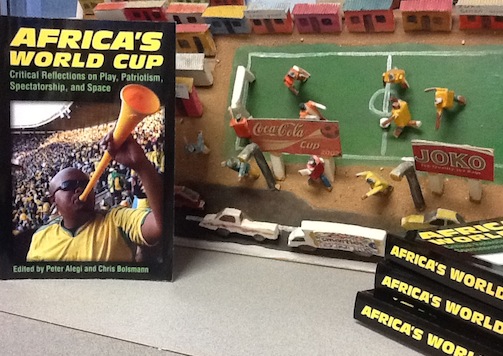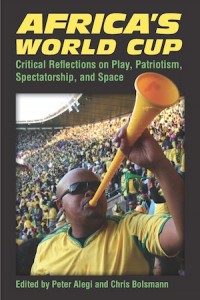
The Football Scholars Forum, an online fútbol think tank I co-founded at Michigan State University, recently launched its 2013-14 season. On October 24, FSF held a lively discussion of Africa’s World Cup: Critical Reflections on Play, Patriotism, Spectatorship, and Space, a newly published collection I edited with Dr. Chris Bolsmann, a South African sociologist based in the UK.
The 90-minute event opened with a consideration of the book’s attempt at blending scholarly and journalistic approaches to exploring the game and its broader implications. The editors and several chapter authors in attendance talked about the process of writing and editing, as well as their experience working with an academic press on a topic with potentially broad appeal.
The book, much of it written in the first person as a loving critique of the 2010 tournament, demonstrates how the FIFA World Cup story is entangled in a web of national and international politics, sporting culture, and global capitalism. Many interventions linked South Africa 2010 to Brazil 2014, particularly through the public financing of expensive and unsustainable new World Cup stadiums in countries with dysfunctional schools and hospitals and high rates of poverty and inequality. The online conversation also featured Luis Suarez’s handball against Ghana and the contradictory legacies of this “African” World Cup.
Participants logged in from half a dozen countries in North America, South America, Africa, and Europe. In attendance: Andrew Guest, Chris Bolsmann
, Christoph Wagner
, David Patrick Lane,
David Roberts,
Derek Catsam,
Jacqueline Mubanga,
Raj Raman,
Orli Bass
, Rwany Sibaja,
Laurent Dubois
, Achille Mbembe
, Jordan Pearson, Sean Jacobs, and Alex Galarza (all via Skype); and Liz Timbs,
Dave Glovsky,
Alejandro Gonzalez, and
Peter Alegi (in East Lansing).
For a Storify Twitter timeline of the event click here.
The audio recording of the discussion is freely available here.
The next Football Scholars Forum event on November 14 will focus on Soccer in the Middle East, a special issue of the journal Soccer and Society (2012), edited by Alon Raab and Issam Khalidi.
Tag: Africa’s World Cup
 By Bruce Berglund (cross-posted from @NewBookSports)
By Bruce Berglund (cross-posted from @NewBookSports)
In 2010, for the first time, an African nation hosted the FIFA World Cup. The advertisements surrounding the tournament used graphics and sounds intended to conjure the image of a vibrant, exotic land. In fact, though, the African-ness of the South African World Cup was pretty thin, when not wholly fabricated. For example, the music that introduced ESPN’s World Cup coverage sounded very African, as it opened with the sounding of an ox horn (the promo showed a bare-chested tribesman blowing the horn atop a mountain, silhouetted against the setting sun) and then built with pulsing drums and a choir singing layered refrains. But the piece had been written by a composer from Utah, the musicians had recorded it in Utah, and the choir consisted of members of the Broadway cast of The Lion King. At least Shakira’s ubiquitous song “Waka Waka (This Time for Africa)” had a more substantial African connection. It had been lifted, initially without credit, from a Cameroonian military song made popular in the 1980s by the group Golden Sounds.
The ironies of the 2010 tournament in South Africa are revealed in a number of essays in Africa’s World Cup: Critical Reflections on Play, Patriotism, Spectatorship, and Space (University of Michigan Press, 2013), edited by Peter Alegi and Chris Bolsmann. In the interview with Peter, we learn of the findings and observations of the volume’s contributors: an international collection of anthropologists, architectural critics, bloggers, geographers, sociologists, journalists, photographers, and former players who all attended matches in South Africa. They make sharp criticisms of class divides at the venues, the nationalism and commercialism, and, of course, the imperial reach of FIFA. But as we hear from Peter, the book’s authors were also fans. When mixing with other fans outside the stadiums, and then cheering their teams when the matches began, even normally skeptical academics and journalists were caught up in the event. Their experiences show that, for all its faults, the FIFA World Cup is still an incomparable event.
Click here to download the mp3 of the interview.